Unknowns aplenty: Cricket and Coronavirus
Being on the verge of resumption of cricketing action, teething troubles awaits all of us. Hope we have answers soon.
2 Min Read
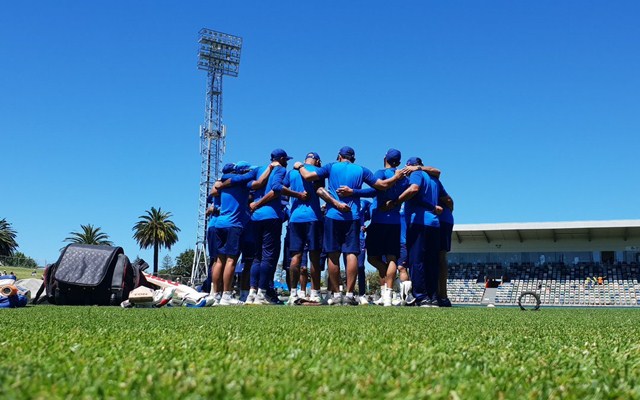

Indian team. (Photo Source: Twitter)

“There is no such thing as impossible.” I’m sure that this clichéd aphorism must have been heard by every human on the blue planet! While listening to this cliché will brim you with optimism and positivity, there’s another side, like always! Indeed, nothing is impossible.
Not even the birth of a bemusing, invisible enemy wreaking havoc on human kind. In these absolutely flummoxing times, there is barely a thing untouched or unaffected by the petrifying Coronavirus, or as it is called, COVID-19. Would we have wanted “Sports” to be into the list of things unaffected by the pandemic? Yes! Did what we want happen? No!
How many of us would have been able to hear, let alone trust, anyone saying “A few days from now, Live Sport will be a rarity”? I would have certainly laughed it off. But, as it turns, nothing is impossible… Bam! Live sport is indeed a rarity today. The Corona-ravaged world is not an easy space for the resurrection of Sports.
Challenges are many and all bigger than one could fathom. The deadly novel pathogen has ensured that even when normalcy is established, the normal is not the pre-Corona normal, but a novel normal. As we pray for the unhindered resumption of International action, let’s take a look at how has this ghastly pandemic affected the most adored sport in India; Cricket.
1. Behind closed doors: A good plan B?
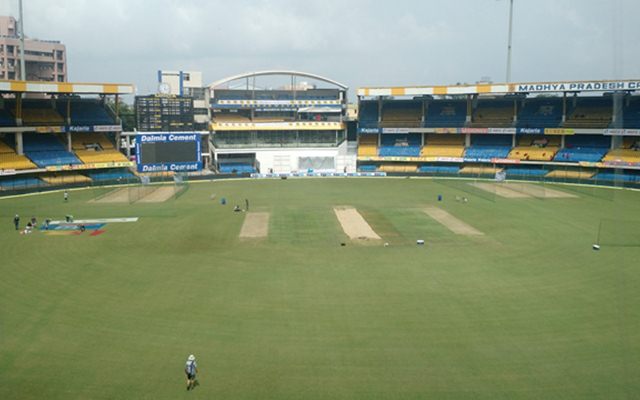
Cricket may be just another sport for some, but in India? Pick up a dictionary and search for the word “religion”, you may find Cricket enlisted as a synonym! There is nothing that this nation feels more frantic about. India could be playing a dead-rubber, but do Indians miss out on a chance to witness live cricketing action? Never! In fact, the undying support and ardency of Indian fans know no geographical confines. India could be playing Australia at Melbourne, and the Indian diaspora down under will ensure painting the MCG blue.
Before you get too carried away, the nature of witnessing Cricket is on the cusp and is going to stay that way for some time. Given the mind-boggling spreading abilities of the virus, cricket is, in all probability, going to be played behind closed doors. No matter how absurd this sounds, the fact that tens of thousands of people congregate to witness live action, with hardly any distance amongst each other, the stadiums can potentially become less of stadiums and more of CO-VID hotspots.
As a zealous aficionado of the game, the idea of cricket behind closed doors is a nightmarish one. What on earth could replace the boisterous stadium erupting jovially as MSD takes a walk inside? Or what could serve an alternative to the awed ovations that Kohli receives as he exquisitely drives one clocked at 150 kmph by Mitchell Starc through extra-cover with sheer perfection?
But, in an option of having no Cricket until everything falls into place and resuming International action behind closed doors, I am undoubtedly going to pick the latter.
The BCCI President, Sourav Ganguly has hinted to be on board for organizing cricket behind closed doors. On being asked about the fate of the indefinitely postponed IPL, the flamboyant southpaw claimed to have been “exploring all possible options”. BCCI Treasurer, Arun Dhumal, in a recent chat,, expressed his desire of hosting the IPL in the “presence of spectators.” However, if left with no other choice, IPL shall be held in empty stadiums, he said.
There’s an economic front to this problem as well. If not all, a considerable part of the revenue generated is by the sale of match tickets. To state the obvious, no audience means no sale of match tickets. But, in having something and nothing, the former is always more feasible. For instance, not having an IPL at all will cause losses to the tune of a whopping 4000 crores!
While the proceeds by tickets may not be on the table, it would be supremely naive of one to think that the revenue generation in cricket is so one-dimensional. In fact, the money made by mediums such as Media rights, title sponsorships, and advertisements is way more than the proceeds of match tickets can ever reach.
While the high decibel noise inside stadiums will be missed, Cricket behind closed doors, for the time being, looks a good plan B.
2. Fitness woes
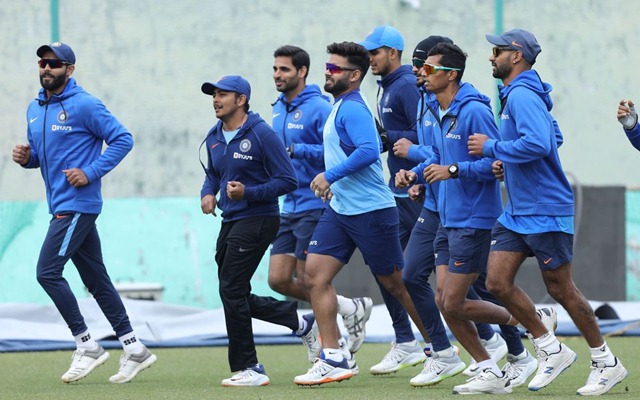
He who says, “Whatever has happened in the recent past was imaginable”, would say nothing but an egregious lie! Prior to the wake of COVID-19, could anyone have imagined such an absolutist lockdown of a nation as humongous as ours? An absolute restriction of movement, not even to the road next to your house! Who could have thought this to be the reality of a country which has one of the lengthiest constitutions on the planet? The one that safeguards every possible variety of freedom by enshrining it as Fundamental Rights? But it did. It did happen. And none of it was unconstitutional! The current situation is unprecedented in myriad ways.
Talking of fitness, I intend to point to physical as well as mental fitness. The never-ending lockdown took a toll on the mental health of many, players being no exception. Mental health, in India, is not given the importance it deserves, but with the appalling rise of such problems around the globe, it could certainly not be written off from the list.
Physical health? The lockdown snatched access to every possible thing one could imagine. Given the dearth of access to gyms, fitness clubs, and the typical equipment present there, keeping a track of physical fitness is an undeniable challenge. Ever since the lockdown began, I have been following nothing but an “Eat-Sleep-Repeat” routine. And trust me, I have been as consistent as Kohli’s performances over the years! I know the players are not as unruly as I am, and hence they have been practicing all possible drills and exercises to stay in shape. Nevertheless, the lockdown woes are applicable to all without an exception.
Also, the tables have turned completely. The international cricket calendar which once looked an utterly congested ally suddenly metamorphosed into a spacious six-lane national highway! How often do players get a break from action, let alone such an unreasonably long one? In fact, if you are a player of substance (Read likes of Sachin, MSD, Kohli etc.), chances are that you will have to skip a series and literally steal rest for yourself.
If the Indian fielding coach, R Sridhar is to be believed, even the sharpest minds will take 5 to 6 weeks to be match-ready. Sridhar, an integral member of the Indian cricketing edifice since 2014, has been preparing a phase-wise training module as per which the training schedule and progress of each player will be vigilantly monitored once they get back to business. He further emphasized on how pushing too hard may lead to injuries, which is why he has formulated a level-wise resumption plan based on the idea of gradually increasing levels of intensity.
Hence, it remains to be seen how the body reacts after all this while. Unlike machines, which too can get cranky if not used for long durations, the human body does not have a button, pushing which one could get back into rhythm promptly.
3. Shining the ball: A different ball game!
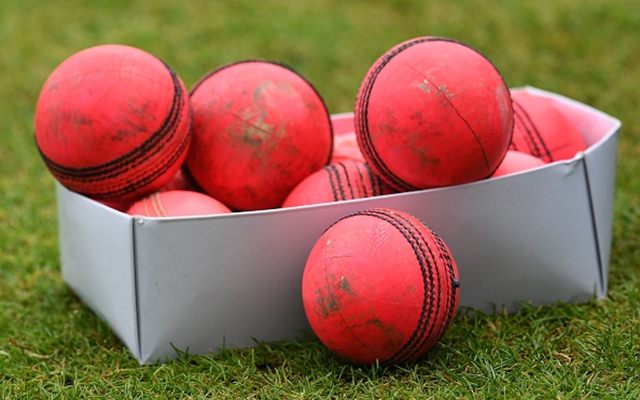
Ever heard young kids calling Cricket by the name “Bat-Ball”. Does it tell us something? Yes, of course, that the world is such a simple place for kids, but also how the bat and the ball are two of the most essential ingredients of the game. Cricket, the sport, is far more nuanced and intricate than just two of these sports equipment, but let’s be that young kid for a while. Let’s look at the game from a perspective as simple as that of “Bat-Ball”.
It is not a world for the bowlers anymore. Is it? Just look at the evolution of this sport over all these years and ask yourself, “Is it a level playing field”? Is the battle between the bat and ball fair anymore? Ever noticed a willow from the 80s? Track the evolution of bats, which use wood worth a tree to be made in the modern-day. Contrast this with the changes the cricket ball has undergone and you will have the answer.
From where I stand and look, the gulf between both these pivotal tools is ever-widening and cricket is increasingly becoming a batsmen-oriented sport. The grounds are getting smaller, boundaries shorter, pitches flatter, bats heavier, two new balls, disappeared reverse swing, fielding restrictions, and the list goes on. As if the cauldron of problems had any scarcity in it, there is a brand new problem staring right into the eyes of bowlers!
The virus can be transmitted through droplets means bowlers can no longer use saliva to polish or shine the cricket ball. The recommendation given by the ICC Cricket Committee under the chairmanship of the Indian spin legend, Anil Kumble, has left the bowlers around the world scratching their heads. Saliva has been used since time immemorial to polish the ball, so that it swings, which is the most lethal weapon in the armory of a fast bowler.
The saliva ban is not a headache merely for the fast bowlers. While non-use of saliva will vanish swing for the pacers, the vulnerability of spinners will increase with the demise of drift. Expressing their views, the Indian spin duo KulCha (Kuldeep Yadav and Yuzvendra Chahal) find this interim measure to be a manifest disadvantage for spinners as the ball would not drift and beating the batsman in the air will be nearly impossible.
Indian pace spearhead Jasprit Bumrah finds it essential to find an alternative to saliva so as to maintain the ball. However, no new substitute (apart from the known sweat) has been recommended by the Cricket Committee. Indian right-arm speedster, Mohd. Shami opines that sweat and saliva act differently on a ball, which is why sweat cannot act as a replacement of saliva. However, the ICC is not willing to permit the use of any other artificial substance (such as wax or polish) as a shiner.
The interim ICC Guidelines released earlier this week (9th June 2020) have only added to the plight of bowlers. The guidelines provide for a 5-run penalty, after two warnings, should a bowler use saliva. Former Aussie pacer, Jason Gillespie, states the biggest challenge to tackle will be the deeply ingrained habit of fast bowlers of “subconsciously licking fingers” and applying them on the ball.
ICC has stated willingness to be less stringent during the initial transitory phase, considering inevitable and involuntary habits, yet after being warned twice, the umpire shall penalize the bowling side by awarding five runs to the batting side.
4. Social distancing: A curse
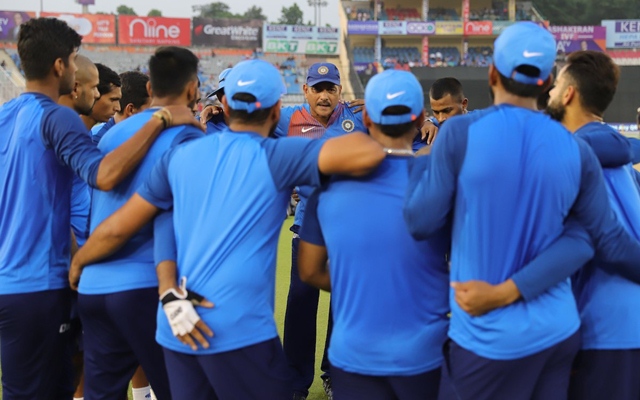
The impact of this pandemic has innumerable facets, from physical to psychological, social to fiscal, and many more… Naming ‘social distancing’ as the trendiest term of the year 2020 would not be wrong. But, the blend of social distancing and sports is a problematic one.
Is social distancing possible in sports? If yes, how pragmatic is it? To which extent can it be maintained? There is a flurry of unanswered questions as we delve into the aspect of social distancing in sports. There are certain sports where the idea of practicing social distancing while playing is insanely ludicrous. Imagine playing Kabaddi with social distancing!
From making a huddle prior to the start of the match to post-wicket celebrations, there are countless occasions on which players on a cricket ground come in close proximity. Just picture an all-animated, rambunctious Kohli jumping ebulliently over Jadeja after his lightning direct-hit results in an incredible run-out. Or just visualize a chirpy Rohit Sharma vigorously hugging Chahal after he knocks a batsman out.
Is there a better symbolization of unity than the huddle which teams get into before the start of play? Is there a gesture more amicable than the handshakes of adversaries after the conclusion of the match, no matter the result? I am afraid such beautiful scenes may no longer be a sight and could only be pictured in our heads, in the coming times. Such would be the imprecation of social distancing in sport.
5. Social bubble: A bubble in itself?
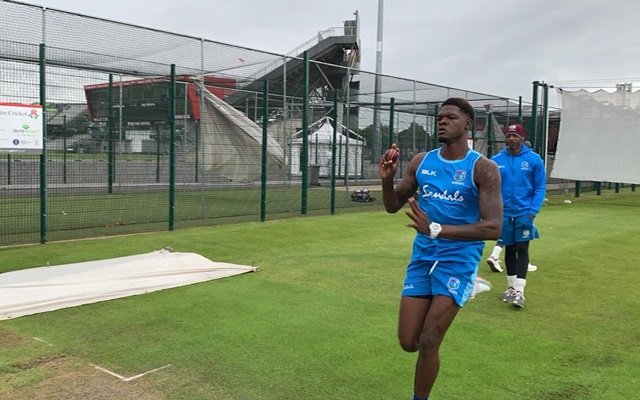
As per a recent research of the University of Oxford has shown how “social bubbles” can be a more effective solution than “social distancing”. Social-bubble implies a strategic reduction in contacting people and interacting with only a few repeated contacts. Simply put, instead of meeting everyone, limit your contact to a very few important and necessary ones.
Imagine a situation, India vs Australia, Border-Gavaskar Trophy, Day 3 of the 3rd Test at the serene Sydney Cricket Ground, (I wish this comforting story could have lasted longer!) a player tests positive. Not a thing in the first two matches, not even on the initial two days of the third and all of a sudden, someone tests positive. What happens? Will all the players from both sides be quarantined? Maybe even the match officials and umpires? Even Grounds-men? You never know. What happens to the incomplete test match?
With international action on the brink of resumption, England and Wales Cricket Board (ECB) and Cricket South Africa (CSA) have stated their will to go with the ploy of Social-bubbles to mitigate the ubiquitous threat of the virus. The former protean pacer, Shaun Pollock, has even advocated for allowing bowlers to use saliva on the ball as the bio-secure environment should negate the fright of using saliva and catching the virus.
While the ECB and CSA are confident about successfully managing the affairs by this method, the former Indian captain, Rahul Dravid, has a differing opinion. The 47-year-old veteran is of the opinion that “bio-bubbles is an unrealistic option with the kind of international calendar we have, number of people involved in a routine game and the travelling schedules of teams”.
So are the reckoners of Social bubbles in a bubble themselves? Maybe, maybe not.
Peek into the future…
Being on the verge of resumption of cricketing action, teething troubles awaits all of us. Hopefully, we will have answers to all these unanswered questions soon. Meanwhile, for all the cricket zealots, there is finally a thing to cheer in these tumultuous times.
~Written by Pratyay Tiwari
Download Our App